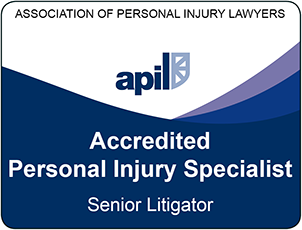What is the NHS Complaints Procedure?
If you are not happy with the medical treatment that you or a family member has received under the National Health Service it is your right to have your concerns investigated and to be given a full and prompt response by the treating body. This is known as the NHS Complaints Procedure.
What Are The Potential Stages Of The NHS Complaints Procedure?
- Stage 1 – Local Resolution
- Stage 2 – The Independent Review
- Stage 3 – The Ombudsman (or ‘Health Service Commissioner’)
Helpful Hints
- Keep a record of all telephone calls including dates and contacts.
- Keep copies of all correspondence sent and received.
- Keep copies of meetings attended and reports on the content and outcome of the meeting.
Which Services Are Covered by the NHS Complaints Procedures?
- All NHS Trusts and NHS Bodies.
- Family Health Services provided for the NHS by GPs, Dentists, Opticians or Pharmacists.
- Primary Care Trusts.
- Private Health Care establishments if the treatment has been paid for by the NHS.
What Do I Want To Achieve?
It is important to think about what you want to achieve before putting in your complaint and what the NHS can do to satisfy this. You may not need to make a formal complaint. If you are more concerned about having something put right or registering a concern informally, you are normally better off raising this directly with staff concerned or their managers. If you prefer you can ask to speak to a Patient Advice and Liaison Service (PALS) Officer. They will try to resolve your problem and provide feedback to the NHS Body.
Under the NHS Complaints Procedure at present the following can be obtained:
- An explanation for what happened.
- An apology or other statement of regret.
- Steps to review procedures to avoid such incidents in future.
In general the NHS cannot:
- Offer financial compensation (although in some circumstances NHS bodies will agree to an ex-gratia payment for relatively small sums)
- Address issues of staff discipline for instance sacking staff or striking off a practitioner (although disciplinary action may result as a consequence of information obtained through complaints investigations).
- Address private treatment unless financed by the NHS.
Is There A Time Limit For Making A Complaint?
You should normally complain as soon as possible so that your and other people’s recollection of events is fresh. Usually complaints should be made within twelve months of the events complained of or within twelve months of finding out there was something to complain about. NHS organisations have discretion to consider complaints outside these time limits and can consider aspects such as the duration of your illness.
Where Do I Start? Local Resolution
If you would like your complaint to be dealt with more formally (for example if you would like to receive a written response to your complaint) you should use the NHS Complaints Procedure. The first stage of this is called Local Resolution, where the NHS body or family health service practice is required to investigate and respond to your complaint.
Ideally, your complaint should be made in writing and addressed to the Chief Executive or, in the case of family health services, the Complaints Manager. In summary, you should include:
- Who or what you are complaining about.
- Where and when the events happened.
- What you have done already about the complaint.
- What result you want- this can include any issues about clinical matters, which the hospital may be able to offer you help with. For instance, if your fertility has been affected by treatment can the hospital guarantee the provision of fertility treatment or pay for the treatment to be carried out?
Helpful Hints
- If you make an informal complaint, take the name of the staff member with whom you have lodged the complaint. The date when you complained and what you were told they would be doing to address your complaint.
- If you commence legal action or say that this is your definite intention the NHS complaints procedure can be brought to a close. However, you are perfectly entitled to take advice from a solicitor without affecting your rights.
What Happens Next?
Your complaint should be formally acknowledged, and an investigation should be commenced. At the end of the investigation you should receive a formal written response from the Chief Executive. The investigation should, ideally, be completed within 25 working days of receiving your letter. Should it take longer the Trust/GP surgery are obliged to let you know when it will be completed.
Sometimes as part of the investigation you may be invited to meetings. Meetings can be very helpful particularly where there are complex medical issues. However, you should be well briefed and prepared for such meetings.
After any meeting if the NHS organisation considers that the matter has been adequately addressed, then they should send you a full written response concluding the Local Resolution stage of the complaints procedure. This should also tell you what to do next if you are not satisfied.
At the conclusion of any meeting it is a good idea to remind the Complaints Manager that you wish to have a full written response.
It is open to you to talk over the meeting with the Complaints Manager beforehand and you may wish to consider:-
- What form will the meeting take?
- Who will attend- sometimes complainants do not want to see staff members who have been involved in the incident in question. In other cases you may be disappointed to find that the staff involved, are not available.
- Ask where the meeting will be held and how long it will take. This is important if you are still recovering from an illness as you may not feel able to attend the whole meeting and can tell the Complaints Manager in advance if you have any difficulties with this.
- It is always a good idea to make a succinct list of your questions for any meeting and to give a copy of this to the Complaints Manager before the meeting – keep a copy to take with you.
- Think about taking a friend, relative or advocate to the meeting for support and to take notes.
- Do not agree with anything at the meeting that you have reservations about.
- What happens if I am not happy with the response to my complaint?
If you are not satisfied with the response to your complaint, you have the right to request an Independent Review of your complaint . However, an Independent Review is unlikely to be granted if it is considered that more should be done to resolve the complaint at Local Resolution stage.
Obviously the NHS organisation cannot solve all medical problems that you have or turn the clock back to how things were before the events complained of, but they should try and answer all you concerns and try to provide as comprehensive an explanation as possible. If you think that they have not done this, you can ask them to take further steps such as asking for further investigation or examination of the medical records. One option is to ask the hospital to consider obtaining or funding an independent report from a medical expert which can be very helpful in resolving any dispute about the medical issues relating to your complaint.
You may like to consider:
- Does the response explain things in a way that you understand? If the reply contains too much medical jargon you can ask for this to be put into layman’s language.
- Does it tell you how the investigation was carried out, for instance were the staff involved in the care complained of interviewed?
- Are there any other matters you are still concerned about?
Often the formal response to your complaint will offer a further meeting to clarify any outstanding issues. This can be useful, and may help clarify issues without the formality and delay involved in an Independent Review. However, you are not obliged to take this option. It is your right to request an Independent Review at this stage. You and the body also have the option of continuing to try to resolve the complaint locally in writing. If you agree to a meeting, the same principles apply as with earlier meetings during Local Resolution – you will need to clarify what you remain dissatisfied with and why (usually in writing). Following any such meeting, or further correspondence under local resolution, you should be provided with a further formal written response dealing with these issues, and you still have the right to request an Independent Review.
Independent Review
If you have attempted Local Resolution and are not happy with the result, or the organisation you have complained about has not completed its investigation within six months, you have the right to ask for an Independent Review of your complaint. In England, the Healthcare Commission (formerly the Commission for Healthcare, Audit and Inspection (CHAI) now holds responsibility for the Independent review stage of the NHS Complaints Procedure. You should make a request for an Independent Review within six months of receiving the care provider’s written response to your complaint. You should try to abide by this time limit but if it is not possible it is always a good idea to ask the Healthcare Commission to consider your request, particularly if you have a good reason for the delay such as trying to obtain other advice.
Important notes:
You will not automatically be granted a full investigation but your case will be screened by a member of the Healthcare Commission’s complaints team who will carry out an initial review of the issues in question.
You may not be allowed an investigation by the Healthcare Commission if you have already started to take legal action, but this should not prevent you taking legal advice and keeping this as an option. However, bear in mind the time limit of three years for commencing legal action.
To consider your complaint the Healthcare Commission will require a signed statement from you about the aspects of the original complaint that you feel have not been adequately addressed. This should be sent as soon as possible after your request for an Independent Review, if not at the same time. Staff at the Healthcare Commission will be able to advise you on what is needed, and if you need help in putting your case for an independent review in writing or independent advice on the procedure you can contact your local provider of Independent Complaints Advocacy Services (‘ICAS’ – see end of leaflet).
Your statement should include:
- A summary of the events in question.
- Details of the main issues of concern.
- Details of what action has been taken so far.
- Details of the aspects that you remain unhappy with.
- Why you feel that further action under the Local Resolution stage of the complaint would not adequately address the issues.
- Why you think an Independent Review would be helpful.
The Healthcare Commission will write to you as soon as it has screened your complaint with their decision and any recommendations. A letter will also be sent to healthcare provider you are complaining about. The options available to the Healthcare Commission are:
- not to take any further action if they feel your complaint has been adequately addressed already
- to refer the complaint back for further attempts at local resolution (you should make sure you explain in your request why this is not a reasonable option, if you do not think that it is)
- to conduct a full investigation, including the possibility of establishing an independent panel of lay people. (Ask the Healthcare Commission staff about this option).
- to refer your complaint direct to the Ombudsman in certain circumstances
Note: Slightly different procedures apply to NHS Foundation Trusts. Contact the Healthcare Commission for further information.
If there is to be an investigation it will be conducted by specialist staff at the Healthcare Commission Complaints Unit with access to the necessary clinical advice. They may need to interview you and any witnesses and may need access to your medical records. It may even be necessary for you to be examined by an independent clinical advisor.
The Healthcare Commission may refer complaints to an independent lay panel for consideration. If you would like this to happen, you should request it. It is however important to be aware that this will not be automatically granted.
The Healthcare Commission must produce a report of his investigation findings or panel hearing findings which will be sent to you, the body complained about and other relevant bodies.
What If I Do Not Agree With The Healthcare Commission’s Decision Or Findings?
You can still ask the Health Service Commissioner (Ombudsman) to investigate further.
How Do I Contact The Healthcare Commission?
Telephone: The Complaints Helpline 0845 601 3012
Website: www.healthcarecommission.org.uk
Email: complaints@healthcarecommission.org.uk
In writing:
Healthcare Commission
Complaints Investigation Team
5th Floor
Peter House
Oxford Street
Manchester
M1 5AX
How Can I Get Independent Help And Advice With The Independent Review Stage?
Your local provider of Independent Complaints Advocacy Services (ICAS) should be able to advise you and may be able to help draft correspondence or accompany you to meetings.
The Health Service Ombudsman
If you are not satisfied with the way in which your complaint was investigated, you can complain to the Health Service Commissioner or ‘Ombudsman’. The Ombudsman will usually expect you to have exhausted the NHS Complaints Procedure. The Ombudsman will not investigate your complaint if you have commenced legal action or have indicated your intention to do so.
The Ombudsman can step in at an earlier stage if the Ombudsman considers that it would be unreasonable for you to proceed with the NHS Complaints Procedure such as undue delays in considering your complaint or providing a response.
The Ombudsman can consider complaints in relation to the following:
- Poor service.
- Failure to provide a service that you have a right to receive.
- Administrative failures.
- Complaints about care and treatment provided by NHS staff after March 3rd 1996.
- Refusal to accept a request for Independent Review.
Time Limits
You should submit your complaint within one year of the events complained of. This can sometimes be extended if, for instance, the investigation at the Local Resolution stage of your complaint took too long.
Will The Ombudsman Automatically Take On My Case?
You do not have an automatic right to an investigation by the Ombudsman and there is no appeal against the Ombudsman’s decision except by Judicial Review through the courts. The Ombudsman reviews only a proportion of the cases the Ombudsman receives every year, but where the Ombudsman does decide to act the Ombudsman will carry out an exhaustive investigation including interviews with yourself and staff involved. This can take several months to complete. After completion of the investigation you will be sent a full report as will the NHS organisation involved.
In order to stand a good chance of being taken on, your complaint to the Ombudsman should make clear:
why earlier investigations/responses are unsatisfactory (include all relevant correspondence if possible),
the injustice you have experienced, and the potential benefits of an investigation (could lessons be learned to prevent the same problems occurring)?
What Can The Ombudsman Do?
If your complaint is found to be justified the Ombudsman will seek an apology or other remedy for you. This may include calling for changes to prevent such an incident happening again or reviewing procedures.
Where recommendations for change are made the Ombudsman can check back to see this has occurred. The Ombudsman also makes an annual report to Parliament which is made public and may name the organisation concerned, particularly if they have failed to comply with the Ombudsman’s recommendations. Your confidentiality will be protected.
Contact Details:
The Health Service Ombudsman
0845 015 4033 (England)
01656 641 150 (The Public Services Ombudsman for Wales)
0800 34 24 34 (N.Ireland Ombudsman)
0800 377 7330 (Scottish Public Services Ombudsman)
If you wish to discuss help with a complaint, please contact our team on freephone 08000 116666 or via email at legal@timms-law.com.
What Our Clients Say














